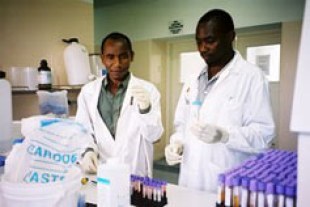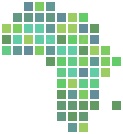HEALTH

Studies in Africa have showed that male circumcision can reduce the risk of contracting HIV by 53-60 percent.
The Rwandan government plans to circumcise two million men in the next two years in an ambitious program that aims to reduce the HIV transmission rate by 50 percent.
This follows successful trials of a non-surgical method of male circumcision called Prepex which experts say is easy to use and appropriate for rural settings. Male circumcision has traditionally been performed surgically.
Prepex device is a simple non-surgical method that requires no sterile setting, no injected anesthesia, and it's a bloodless procedure with no need for sutures. More »
Current News
Health
- Fighting for the Rights of Child Soldiers
- Progress Towards a Food-Secure Africa
- UN Sees 'Massive' Fall in Aids Cases
- Public Health Risk As Taps Run Dry
- Displaced Face Malaria Outbreak
- SADC Countries Battling to Reach HIV Positive People
- Eastern, Southern Africa Scale Up Efforts Against High Aids Prevalence - UN Official
- more headlines »
Uganda: Women Deliver Under Tree

(file photo) At a hospital in Pallisa District, healthworkers have built a makeshift shelter under a tree to help mothers deliver their babies, Daily Monitor has learnt.
Botswana: A Timeline of HIV Action

Botswana has marked many "firsts" in Africa's fight against the HIV virus. Here are details of the most important events in its battle.
MSF Closes Its Largest Medical Center in Mogadishu

Following the tragic killings two employees, the medical humanitarian organization Médecins Sans Frontières sees itself forced to end all activities in Somalia's capital, including the closure of two separate 120-bed medical facilities.
Zimbabwe: Multi-Drug Resistant TB on the Rise

Cases of multi-drug resistant TB continue to increase, with 76 cases recorded so far, a senior health official has said. According to records, 27 people with MDR-TB were put on treatment in 2009 and the cases rose to 74 in 2010.
Tanzania: Good Progress in Male Circumcision Campaign

In some parts of western Tanzania, circumcision levels are as low as 20 percent but a recently launched program aims to circumcise 2.8 million males aged between 10 and 34 within five years.
Kenya: Solar Power Just What the Doctor Ordered

Faced with rising energy prices and frequent electricity blackouts, hospitals and medical clinics in Kenya are turning to solar energy to provide life-saving power.
Africa: Emissions Cuts Offer Quick Health Benefits

Reducing methane and black carbon emissions could quickly tackle climate change while improving food security and people's health, especially in developing countries, a study says.
Africa: Yaws Treatment Study Prompts Review

Since re-emerging in the 1970s, yaws has affected an estimated 460,000 people - mostly children - in poor, tropical rural areas, mainly in Africa and Asia.
Call for Global Neglected Disease Database

Information relating to tropical diseases is essential for planning and implementing cost-effective, sustainable control interventions in areas where there is limited knowledge of disease distribution, researchers say.
West Africa: Program to Investigate Buruli Ulcer

Maggie Hallahan/Sumitomo Chemical
West African researchers hope to identify how Buruli ulcer bacteria (Mycobacterium ulcerans) are transmitted to humans, through the development of an international and multidisciplinary research programme.
New HIV/Aids Research Findings Focus on Youth

The U.S. National Institutes of Health is releasing research findings that could have a direct effect on the well-being of the millions of children, adolescents and young adults infected with HIV or with fully developed Aids.
Tanzania: Rats Sniff Out Land Mines and TB

Next year supplies of rats will be sent to Angola, another country struggling with millions of land mines left behind after the war, which ended in 2002.
Senegal: Double Sentence - Aids in Prison

(file photo) Prisons are high-risk environments for the transmission of HIV, due to the prevalence of hard drugs, violence and sexual relations.
Western Cote d'Ivoire Blood Shortages Claiming Lives

Blood shortages at hospitals and health centres in western Côte d'Ivoire are causing unnecessary deaths, especially among children, say local and international health officials.
Zambia: Cervical Cancer - 'A Battle We Can Win'

Cervical cancer affects millions of Zambian women each year. But it is quickly being brought under control thanks to new vaccinations, screening programmes and possibly even former U.S. president George Bush.
Zimbabwe: Growing Risk of Waterborne Diseases in Rural Areas

Young boys play in a river known to be a source of waterborne diseases. With the advent of the rainy season and poor sanitary and hygienic facilities, rural and peri-urban communities are vulnerable to waterborne diseases.

A 2008 survey found that pain was the main complaint for 87 percent of patients in Zambia, while 98 percent of health workers lacked the skills to assess and deal with pain properly.
"I had no power, I could not even walk. I just had to be lifted by someone. When bathing, when going to the toilet, when going anywhere," Geoffrey Mwila says in a soft voice.
Forty-three-year-old Mwila, lying in bed, coughs often in between his short sentences. Weakened by HIV, he was severely affected by tuberculosis and found himself on the verge of death only a few weeks ago.
His unbuttoned shirt reveals an extremely frail body, but compared to when he was first brought to this hospice, he has improved miraculously.
Malawi: Stemming the Tide of Health Worker Migration

A recent report estimates that nine African countries have lost U.S.$2 billion worth of investment in training and educating doctors who have subsequently migrated abroad. It needn't be this way.
Kenya: New Guidelines Follow Recall of Faulty HIV Test

The Kenyan government has changed its HIV testing algorithm following the withdrawal of a widely used brand of HIV test on warnings from the UN World Health Organization.
Top Female Kenyan Scientist Reflects on Historic Research

At the Malaria Forum hosted by the Bill and Melinda Gates Foundation in October, the latest findings on what is currently the most viable malaria vaccine candidate in medical history, known as RTS,S, were announced.
Zambia: Benefits of Home-Based Care for Families

Home-Based Care has been and will continue to be an integral part of care given at community and household level because the patient remains part of their homes as brothers, sisters, parents and children.
Gambia: Aids Survivor on Nationwide Trek

A young man has taken a bold step by trekking across Gambia and campaigning against the HIV/Aids epidemic.
Uganda: Nodding Disease Ravages Family

(file photo) While mothers take pride in bearing children and happily watching them grow healthily, Santa Alok's memories of giving birth only bring her pain and sorrow.
Polio's Last Percent
Positively Proud
Africa: 10 Big HIV Stories of 2011

(file photo) An HIV/Aids orphan sits on an old bus seat. It's been a roller coaster of a year regarding HIV and Aids. And with new evidence of the effectiveness of treatment as prevention, experts are increasingly talking about "the end of Aids".
Cholera Outbreak Still Not Contained

The cholera outbreak that has infected thousands of people across the Democratic Republic of Congo is almost over in the worst-affected province, but fresh cases are being recorded in two other areas.
HIV and Non-Communicable Diseases

While antiretroviral drugs have significantly improved the life expectancy of people living with HIV, the virus can make people more susceptible to non-communicable diseases.
Senegal: All That Glistens Is Not Gold

In eastern Senegal, the prevalence rate of HIV has raised concerns among NGOs and health officials. Prostitution is widely practiced in this gold-bearing region, but gold is both a blessing and a curse.
TOP HEALTH AND MEDICINE HEADLINES
- IRIN Africa: Fighting for the Rights of Child Soldiers [analysis]
- IPS Africa: Progress Towards a Food-Secure Africa
- RNW Africa South Africa: UN Sees 'Massive' Fall in Aids Cases
- IRIN Cote d'Ivoire: Public Health Risk As Taps Run Dry
- Monusco Congo-Kinshasa: Displaced Face Malaria Outbreak [press release]
- Health-e Southern Africa: SADC Countries Battling to Reach HIV Positive People
- UN News Africa: Eastern, Southern Africa Scale Up Efforts Against High Aids Prevalence - UN Official
- Monitor Uganda: Government on the Spot Over Nodding Disease
- Observer Uganda: Agricultural Chemicals Hurting Kids
- New Times Rwanda: Dangerous Abortions 'On the Rise', Says WHO
- IRIN South Sudan: Women Face Multiple Risks - Report
- Times of Zambia Zambia: Sata Appoints Kazunga Minister
- Public Agenda Ghana: Congestion At Kath Inevitable
- Public Agenda Ghana: FDB Bears Teeth At Finatrade
- Public Agenda Ghana: Gertech Blamed for Kath Equipment Breakdown
- Nairobi Star Kenya: Oniang'o Resigns As Chair of Moi Referral
- RFI Africa: African Press Review 20 January 2012
- Shabait Eritrea: The Public Called Up On to Enhance Role in Strengthening Health Service
- ACNS Tanzania: From Texas to Tanzania - Anglican Hospitals Link Up
- SNA Sudan: New Medical Equipment for Endoscopic Surgery Inaugurated
- Daily News Tanzania: Call to Mainstream Disability to National Strategies
- Biz-Community South Africa: 2012 Trends - Health Is the New Wealth [opinion]
- Daily News Tanzania: Doctors Flex Muscles With Govt
- Daily News Tanzania: Call to Mainstream Disability to National Strategies
- Vanguard Nigeria: Don't Politicise Health - Minister
- more headlines >>
Current News
- Africa: Fighting for the Rights of Child Soldiers
- Africa: Progress Towards a Food-Secure Africa
- South Africa: UN Sees 'Massive' Fall in Aids Cases
- Cote d'Ivoire: Public Health Risk As Taps Run Dry
- Congo-Kinshasa: Displaced Face Malaria Outbreak
- Southern Africa: SADC Countries Battling to Reach HIV Positive People
- Africa: Eastern, Southern Africa Scale Up Efforts Against High Aids Prevalence - UN Official
- Uganda: Government on the Spot Over Nodding Disease
- more headlines »
Sustainable Africa
Resources
- End7 Campaign - Our Mission in a Minute
- Coast is clear! Govt rules out Ebola in KNH Mystery Deat
- Kenya's TB Campaign Proves a Success
- Keiskamma - A Story of Love
- Tender Moments South Africa
- Sami Yusuf - Forgotten Promises
- A Special Message From Sami Yusuf
- Sami Yusuf on the Horn of Africa Famine
- Polio's Last Percent
- Positively Proud
- Looking Back at the Big Global Issues of 2011
allAfrica.com
- FREE EMAIL HEADLINES
- Special Reports & Briefings
- Photo Essays
- From allAfrica
- Sustainable Africa
- Topical Focus Pages
- Resources and Documents
- RSS Feeds
- BlogAfrica
- Arts, Culture, Entertainment
- Books
- Book Reviews
- Children & Youth
- Conflict and Security
- Crime and Corruption
- Economy, Business, & Finance
- Editorials
- Education
- Environment
- Food, Agriculture and Rural Issues
- Health
- AIDS
- Malaria
- ICT and Telecom
- Legal Affairs and Crime
- Media
- Music
- Music Reviews
- Religion
- Refugees
- Science and Biotech
- Sport
- Soccer
- Travel
- Women
- U.S., Canada and Africa
- Europe and Africa
- Asia, Australia, and Africa
- Middle East and Africa
- Latin America and Africa
- Internet Gateway
- Content Providers

